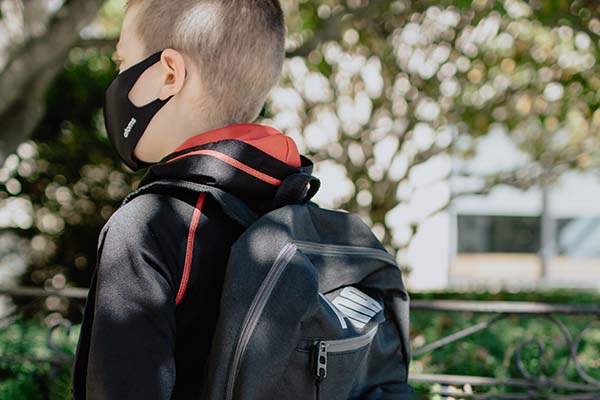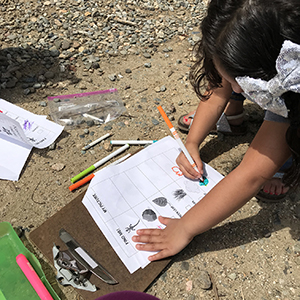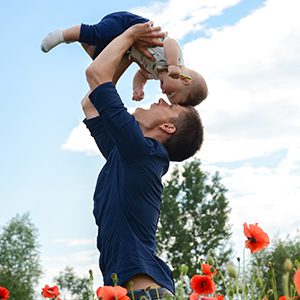Preparing for the New School Year
By Nicole M. Young, MSW
The back-to-school routine is going to be bittersweet for me this year. I’m excited for my kids, who will experience their senior years in high school and college with in-person classes and activities. They’re excited about returning to a more “normal” routine, but there’s also some hesitation about returning to a regular (i.e., earlier, non-pajamas) school day and busier, crowded environments. As for me, I won’t miss the extra dirty dishes and unstable internet during Zoom meetings, but I will miss their presence during the day and will treasure the extra time we had together.
This monthly column provides tips for anyone who is helping raise children, based on the world-renowned Triple P – Positive Parenting Program, available to families in Santa Cruz County. If you have a question or idea for a future column, please email me at [email protected].
Dear Nicole,
My 7- and 12-year-old grandchildren live with my partner and me, and all of us are nervous and excited about school starting. Going back to in-person school will be a big transition for them, and it’s been a long time since we’ve done “the parenting thing.” Do you have any tips to help us prepare for the new school year?
– Damian
Dear Damian,
The beginning of the school year can be challenging in the best of times, and emotions are likely to be heightened this year because of the ways COVID has impacted daily life. Here are a few tips to try:
Talk about going back to school.
Ask each child what they’re looking forward to, what they think will be different because of COVID, and whether they have questions or feel worried about anything. Let them know that for now, students are required to wear masks indoors at school to help keep everyone healthy, but this won’t last forever. Validate and accept their feelings, and encourage them to say more (“I can see why you might feel that way. Can you tell me more about…?”). Ask what support would be helpful, then listen to their answers. Wait to offer your ideas until they ask for help so they can express their needs and use problem-solving skills.
Support social connections.
If your grandchildren are nervous about re-establishing friendships, help them identify steps they could take now so they feel connected with peers when school starts. This could include getting together in person (depending on what feels safe and comfortable for your family), or reconnecting through texts, phone, or video calls. If this feels overwhelming to them, suggest they start with 1-2 friends. Then help them develop a plan for the first day of school—i.e., who they’ll hang out with at recess or breaks and eat lunch with—which can help reduce anxiety about the social aspects of school.
Re-establish routines.
Gradually ease back into routines 1-2 weeks before school begins. Discuss what their daily routines were like last year, then talk about what will be different this year. For instance, if the in-person schedule starts earlier than the remote learning schedule, then wake-up times and bedtimes may also need to be earlier. Or, getting ready and getting to school will take more time than turning on a computer, so they’ll need to adjust their morning routines accordingly. If needed, set a “screen curfew”—the time when electronic devices need to be turned off each night. Identify things you and they can do each evening to make the mornings easier, like setting out clothes, packing backpacks, or preparing lunches.
Also ask about routines they started during COVID and want to continue, like going on family walks, taking breaks for physical activity, or doing mindfulness exercises. Then have (or help) each child write or draw the steps and times of their weekday routines and post them in a visible place.
Practice the routines.
Each day, have them wake up and go to bed a little earlier, beginning at least a week before school starts. Have them follow their morning routine (even if they’re not going anywhere) and bedtime routine so that this feels familiar when school starts. Prompt them to look at their routines—“What’s the first step? What comes next?”—and give encouragement and descriptive praise—“You did a great job getting up on time. Keep it up!”
Final Thoughts
Transitioning from summer to school can be difficult, even without a pandemic. Preparing for the transition will help everyone adjust to old and new routines, which will help kids have a positive attitude and learning experience throughout the year.
Nicole Young is the mother of two children, ages 17 and 21, who also manages Santa Cruz County’s Triple P – Positive Parenting Program, the world’s leading positive parenting program. Scientifically proven, Triple P is made available locally by First 5 Santa Cruz County, the Santa Cruz County Health Services Agency (Mental Health Services Act) and the Santa Cruz County Human Services Department. To find a Triple P parenting class or practitioner, visit http://triplep.first5scc.org, http://www.facebook.com/triplepscc or contact First 5 Santa Cruz County at 465-2217 or triplep@







